
|
|
Primal
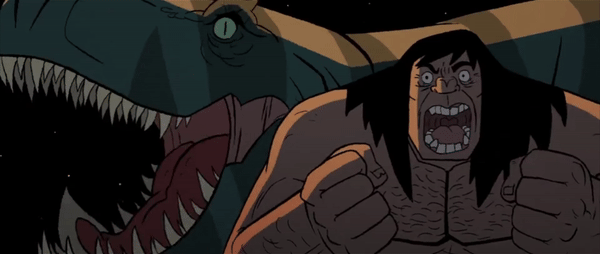 For some moments in life, there are no words. Sometimes you just gotta go fuckin' ape shit. God I love animation. While I often clash with them over various dumb opinions, I know cinemaphiles will at least agree with me on this: visuals have more power than most people consciously realize. The way each shot of every scene is framed conveys subtle information about the characters and their stories. Things like lighting, color, and even weather all act in service of the show's identity and vibe, and visuals are one of the most crucial ingredients to making a show stick out in memory. The limitless potential of animation has the power to bring a show's visual identity to its full potential in fantastical and creative ways that no other medium can even touch. And that's why it's so important to me that when giving praise or attention to an animated show, I not base it on how "good" the animation itself is, on a technical level, but rather what it adds to the work as a whole, and why it matters that the medium was chosen in the first place. Primal is the perfect example of all of the above.
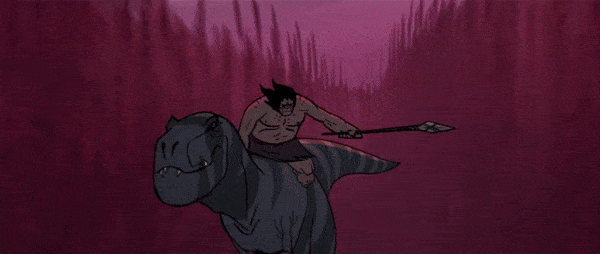 Accurate depiction of walking through tall grass in the post-game of any Pokémon generation. If you've never heard of him, color me shocked, but Genndy Tartakovsky is - to me - easily one of the most interesting and skilled animation directors of the modern era. His work in the cartoon biz dates back to the early years of Cartoon Network, working on Hanna-Barbera's cult classic "2 Stupid Dogs" before moving on to his own string of hits for the station, including long-time staple bangers such as Dexter's Laboratory and Samurai Jack. Known for his exaggerated art styles and use of Akira Kurosawa-esque cinema techniques, Genndy's work is as much artful as it is comical, and his decidedly odd blend of squashy, stretchy characters and gorgeous striking visuals make for a wholly unique experience in every show he creates or directs. Primal embodies all of this and more, pushing Genndy's stylization and eye for subtle detail to its limits, thanks in large part to the show's almost completely mute approach to storytelling. For nearly the entire duration of the first season and a large chunk of the second, no intelligible human words are ever spoken by the main characters beyond simple grunts, roars, and various gutteral utterances. In and of itself, it's not a unique premise for a cartoon; many classic shows get by just fine without the use of verbal language. But in order to do this and remain entertaining, they demand a very sharp visual acuity to properly convey story and emotion. Animation naturally provides the perfect vehicle for this, allowing every scene to be perfectly composed and choreographed in order to tell a complete story in a very organic, show-don't-tell kind of way.
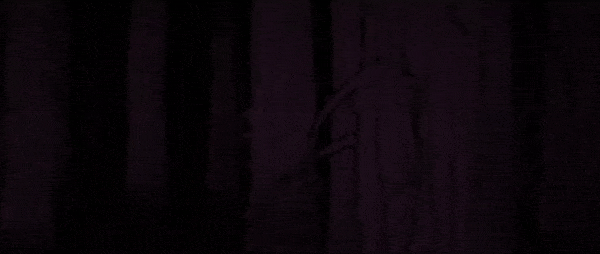 Put simply, this is not a show you can just put on in the background. It demands your full attention at all times. The show's premise is a very simple tale of survival, and generally keeps itself simple in order to capitalize on its lack-of-dialogue approach. At the dawn of history, a human neanderthal (who coincidentally resembles a one-off side character from an old episode of Dexter's Laboratory) suddenly loses his only family in a dinosaur attack*. Enraged and embittered, the caveman makes like a primate and goes ape shit in retaliation, fearlessly fighting off the beasts with his raw strength and trademark primitive tools. On the flip side, a mother tyrannosaurus (presumably; I'm no dinosaur expert but I know there are countless subspecies of dinosaurs that are commonly misidentified as T-Rexes) also finds herself victim of this same roving gang of brutes, and her children are gruesomely gobbled up by its alpha leader. Caught together in the fray, the human (internally known simply as "Spear") and the mother ("Fang") end up working together to exact bloody vengeance on the predators, if for no other immediate reason than blind rage and the - wait for it - primal urge to stay alive at all costs. *Yes, yes, I know, humans and dinosaurs never coexisted at the same point in time in real world history, but as with most of his works, Genndy thrives on anachronism and historical inaccuracy, and I agree with this stylistic approach whole-heartedly.
 Realism schmealism, style IS a form of substance in my book! Unsure of what to live for after the loss of their families, Spear and Fang form a tenuous bond and silently agree to travel together. An unlikely pair of vagabonds struggling to simply exist in spite of an ever-changing world populated by infinite hordes of murder-beasts who otherwise see them as nothing more than dinner, the two of them pick a direction and start walking, taking each other for the only "family" either one has now, for better or worse. And as if Spear being unable to speak his thoughts to the audience wasn't enough of a challenge, he also can't communicate with Fang outside of exaggerated body language and a lot of wordless screaming. Butting heads over everything from which road to take to who gets to eat first, the two of them spend the entire series begrudgingly looking out for one another and learning to trust that they both do in fact have each other's best interest at heart. The bond they form as they conquer peril after peril becomes the emotional foundation upon which the rest of the show's stories are built.
 Even when you end up choosing your family, there are times you'll still feel like you can't choose your family. Although the show is famously unafraid of violence and in fact quite gory, never once does it shy away from its roots as a cartoon first and foremost. Genndy has often expressed in interviews that he does not believe that a show must look or act "serious" in order to be taken seriously, and you can usually spot this at a glance in any of his works. Even in a gruesome show like Primal, characters are composed of unrealistic shapes and often make goofy exaggerated expressions. And while this type of art is generally used to make us laugh, even that doesn't stop the emotional core of its story from hitting just the same. In fact - just as in some of Genndy's other works such as Samurai Jack and Unicorn: Warriors Eternal - I would argue that the cartooniness of the characters only further endears us to them, arguably making those emotional beats hit even harder. In lieu of having no spoken dialogue, Primal's entire story is carried by the masterful visual framing and body language of the characters. Spear and Fang both emote in exaggerated but perfectly readable ways that never fail to convey exactly what they're feeling or trying to tell one another. The interspecial language barrier makes this even easier, since it requires them to pantomime their intentions not only for each other's sake, but for the audience's sake as well. The brilliant part is that it's not only necessary to pay full attention so you can understand what's happening plot-wise, it's also still entertaining to do so, once again underlining the sheer power of animation!
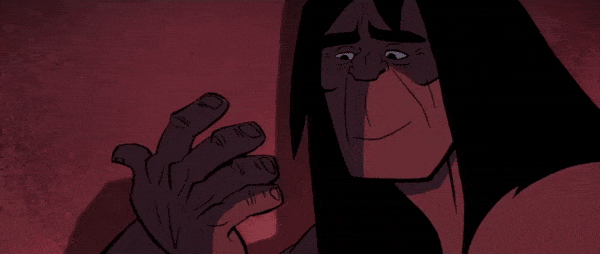 AND he does childrens' birthdays? How is this guy still single?! The sharp eye for visual humor - especially where timing is concerned - also translates very well to the show's action scenes, which are another staple of Genndy's works. Stylistically borrowing from the best of old-school anime (everything from classic heroics like Astro Boy to hyperviolent beatdowns a la Fist of The North Star) and mixing it with the fluidity of iconic American comedy productions (the loose, surreal movements of Fleischer cartoons or the over-the-top theatrics of Tex Avery and Looney Tunes), the fight scenes in Primal are quite a sight to behold. And while they certainly carry a flashy and energetic momentum, they rely on clear choreography and accurate camera tracking make them easy to follow without getting overwhelmed. That said, the show's aggressively cartoony art style doesn't prevent things from getting downright brutal. All manner of blood and viscera are on display here, from punctured organs to brain-leaking split skulls, and the show makes frequent use of showing its characters in immense, horrific pain. It can be a very difficult watch at times, but then again, most great fiction is.
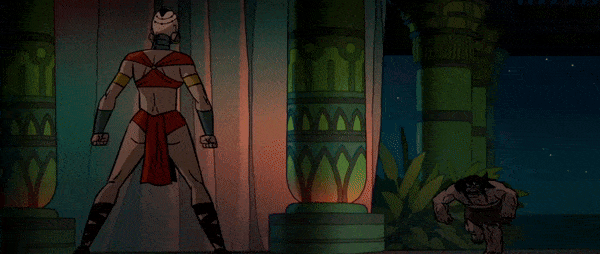 I'm a wuss when it comes to blood and gore, so here's a "normal" fight scene gif instead! While the first season generally sticks to an adventure of the week format, pitting our protagonists against all manner of prehistoric beasts and occasionally other primitive proto-humans, the second season follows a direct serial plot centered around a mysterious woman who introduces herself (and the concept of spoken language to the show) as Mira. A complete mystery of a human entirely different from Spear (whose only spoken word in the entire show is Mira's name), she seems to be an escaped slave on the run from her captors, and joins the team in a bid to keep it that way. Throughout the rest of the season and into the series finale, the group is relentlessly pursued across the ocean by various tribes of humans, each hailing from a different culture based on real-world ancient civilizations. Mira herself speaks (from what I've researched) a Lebanese dialect of Arabic, suggesting an East African or "Middle East" nationality, and the season's antagonists are comprised of a mish-mash of various Sea People cultures, including Egyptian, Babylonian, and - unsure of this one - Kenyan or South African heritage, plus a tribe of sea-faring Vikings and Scottish Celts.
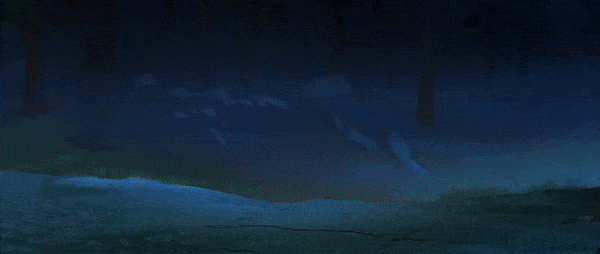 I know swords are generally the preferred weapon of legends, but we GOTTA start showing love toward more versatile and interesting ones like spears. I also noticed the historical references in the show have sparked a lot of interesting discussions online, particularly on Reddit. I read through a few discussions looking for clarification on the civilizations represented here and found a lot of fascinating insight for how these tribes might have interacted in real-world history, and how Primal ties all of this into its own story. Culture, anthropology, and geography are all very interesting subjects to me, and watching a (presumably North American) neanderthal and his dinosaur friend get tangled up in the wild webs of Mediterranean nations was absolutely fascinating. Another thing I want to bring up here is the show's interesting approach to Vikings. With the ubiquitous rise of Scandinavian-flavored stories in modern media over the past ten to fifteen years (especially in the game-o-sphere), it's easy for storytellers to gloss over some of the less noble parts of Viking history. Aside from their well-documented history of plunder and rape, oft forgotten is the Viking slave trade that stretched across Europe and out toward the Black and Mediterranean seas. One of the primary story elements that pushes season two forward centers on a Viking clan leader chasing after our main characters (oops, almost called them "heroes") in a bid to reclaim Mira as his slave and exact revenge on Spear and Fang for their brutal murder of his family.
 Somewhat unrelated, but god damn the seamlessness of this gif sure makes me feel some kinda way. In many ways, the core theme of Primal is one of family, whether talking about loved ones, community, or found family in Spear and Fang's case. But this is also contrasted and balanced against a theme of survival at all costs, and how family can affect or be affected by that approach. When backed against a wall, or when either of their lives (or Mira's) is threatend, both Spear and Fang release their inhibitions and fall back on the one thing they're best at: extreme violence. After slaughtering a Viking village - women and children included - in a bid to help Mira and her fellow enslaved people escape, the gang find themselves pursued by the village's surviving chieftain, wracked with grief and unyielding rage over the brutal bloody loss of his entire family. The story walks a very fine line between presenting the chieftain as a sympathetic villain and reminding you that he is also not a good person to begin with. A slave trader and likely plunderer, but a family man all the same. It's a solid reminder that people are multi-faceted, and while it's certainly okay to feel empathy for the man who lost his family in a horrific and violent massacre, at the end of the day it's more important that he still be judged on his own actions, not just by what actions happen TO him.
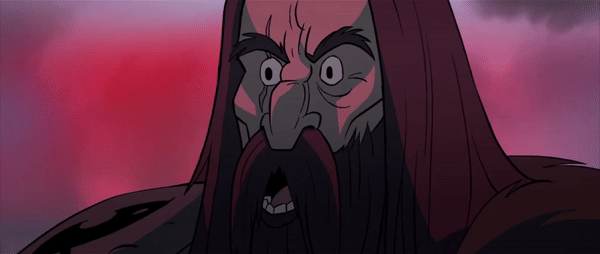 Considering he falls into the pits of hell upon his death and subsequently strikes a bargain with the devil to become a flaming demon juggernaut stuck in Kill mode, that judgment should still be pretty easy to make. Anyway, to sum it all up, Primal is an utterly fantastic work of art. Its perfect balance of wordless storytelling and keenly stylized animation truly embodies the spirit of the medium and Genndy's direction even carries it to new dimensions by seamlessly blending the best of the old with the best of the new. Unequivocally living up to its name, the show thrives on the primitive instinct for survival alongside the need for companionship and the lengths to which people will go in order to acquire or maintain it. My follow-up recommendations are going to feel a little sparse this time around, but only because there's not much out there that can really stack up against what Primal has to offer. Your best bet is to simply watch other Genndy Tartakovsky shows, of which I recommend starting with Samurai Jack. Otherwise, Scavengers Reign is a likely bet, drawing on similar themes of survival in a hostile alien world, but with a more grounded and realistic approach rooted in science fiction. Beyond that, you *might* enjoy some of the weirder, more stylized "adult anime" classics like Requiem From The Darkness or Mononoke, but they share very little in common with Primal outside of "if you liked one, you might like the other".
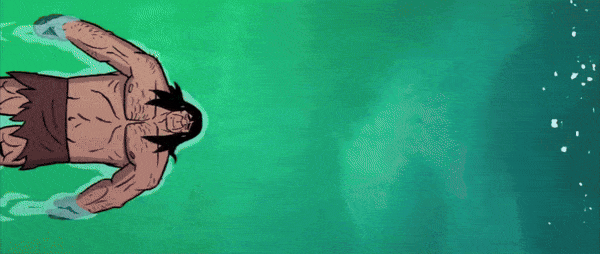 Good vibes, bad vibes, you know they've had their share. The animation industry remains a complete corporate shitshow at the moment, but god damn if there aren't some serious diamonds in the rough still being produced in the process. I remain skeptical that we'll get many shows as wildly creative as Primal in the coming years, but I refuse to give up hope. At the very least, I'll be eagerly awaiting whatever delicious new recipe Genndy helps cook up!
|
|